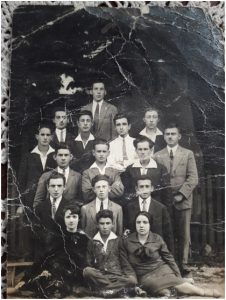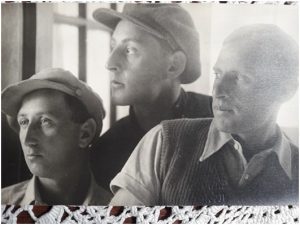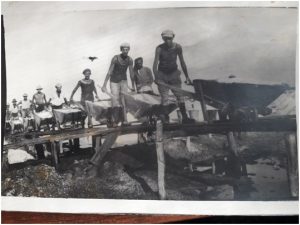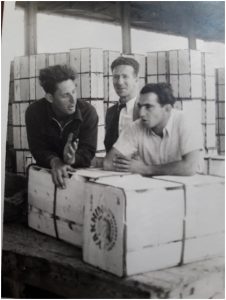Arie (Leib) Pruzhan
My Father - Arie (Leib) Pruzhan - written by Yael Pruzhan.
He was born in Vilna in 1909 and lived on Stefan the Great St. 25/16.
I do not know much about my paternal grandparents. I know that my grandmother – my father's mother, came from a family of glaziers and was called Fruma Musia. Her father's name was Moshe Bar Zusman. Her mother's name was Cyril (my great-grandmother). My father's mother died of tuberculosis at the age of fifty-three. The name of my father's father was Mordechai. The name of Mordechai's father (my great-grandfather) was Lazar. They were from a family of butchers, but grandfather Mordechai, was a small merchant who traveled between villages selling goods. My father's mother died of tuberculosis when father was fifteen. She suffered greatly from the disease in the last years of her life and could barely function. Grandpa married a second wife. I do not have details about her. She was murdered in Ghetto Vilna during WWII. My grandfather, my father's father, died - apparently - before the German occupation.
My father was the youngest son and had to deal with his mother’s illness and his father’s absence. His sisters were already married, and ran textile shops on the main street of Vilna. His older brothers also left the house, scattering in every direction. Later, when his father married another woman, the situation improved slightly.
At the same time, he did not know the family from his mother's side. At thirteen he was attacked on the street by a group of older Jewish boys, but the leader of the gang told them, "This is my cousin. Leave him alone."
My father became strictly secular at a young age. He started eating pork at the age of fifteen. When he was sixteen, he was attacked on the street by a group of young Gentiles who tried to force-feed him pork. Father used to eat pork, but in this case, because of the attempt by Gentiles to force him - a Jew – to eat pork from the hands of Gentiles - he preferred to be beaten up. Following this, he made two drastic decisions: A. To make Aliyah. B. To learn boxing.
By the way, he always claimed to have lived to a good old age and was in good health, because he ate pork.
When he finished high school, he left for the Klosova (Klesiv) training center in the Wołyń district of eastern Poland. Training at this center was considered very prestigious, and not everyone was accepted. At first, my father worked like everyone in the quarry. There they cut stones and crumbled it into gravel. After a few months, an old Gentile Polish man arrived for training. He was a constructor looking for a young man to help him with construction work. All the men were presented, and he chose my father, who was 1.89 cm tall and looked like a strong person. My father worked with him in construction for about a year and a half, and learned the secrets of the profession. He told me that every time he went to get the cement bucket - even if he had left the bucket for five minutes - it was necessary to mix the cement again before using it. Years later, in Israel, he passed tests to get a degree in construction in Solel Boneh. He said that as soon as he stirred the cement, they decided to give him a Grade A' scaffolder certification - the highest possible.
He slept for two years in Klosova - bed to bed - next to Benny Marshak - an important detail to which I will return to later.
In 1929, after two years in Klosova, he completed his training and made Aliyah to Israel to join Kibbutz Yagur. Another graduate of the training traveled with him. The trip was to Warsaw; from there by train to Berlin and from Berlin by train to Trieste in northeastern Italy; from Trieste by ship to Israel. The journey from the training center to Trieste took three days. Since he did not tolerate the girl that was traveling with him, he did not exchange a word with her for all three days until boarding the ship. There he already had the company of others.
He spent less than two years in Kibbutz Yagur. He worked draining swamps in the area. He contracted malaria and later typhoid. As a child, I still remember his attacks of malaria. He would get chills even in the middle of summer, and we had to take out duvets to cover him. Despite everything, he would still shiver. This was later followed by heat attacks. At some point, all this stopped. I don't know if he received medication that cured him or hormonal change due to his age solved the problem.
He left Yagur because he said they were "not real socialists." He told me this when I was seventeen and wanted to join Nahal. He asked me why I wanted to go to a kibbutz. I answered that this was the education I received at home -to be a socialist -and what is more socialist than a kibbutz? So he answered: "They haven't been socialists since 1929." The cook in the Yagur kitchen kept the larger dishes aside for her friends. In the clothing warehouse, the storekeeper kept the better clothes for her friends (and these are just some of the examples he gave me). He ended with the question: "Do you now think that forty years later they are more socialists?" A year in the kibbutz made me understand what he was talking about.
After Yagur, he arrived at Degania. He stayed there for over half a year, but they too were not socialists enough for him. He then went to Ness Ziona, and worked as a "supervisor" in the orchard. I mean, he worked like everyone else, but also checked who worked and how many hours they worked. At the end of the work day, he would sign paperwork detailing who worked and how many there were. With that, every worker approached the Histadrut treasurer - because all the workers got the job through the Histadrut - and only with my father's signature could they get their salary. Why is this important? Father was an indirect partner in the Ness Ziona trial (Ben-Gurion v. Ness Ziona workers). In 1931, Hashomer Hatzair had a majority in the Histadrut elections. They refused Ben-Gurion's proposal to establish a kibbutz near Ness Ziona, claiming that there was not enough work for Jewish and Arab workers in Ness Ziona. The response was a fight for Hebrew labor. Hashomer Hatzair members refused and said that workers are workers and that everyone should be taken care of. Ben-Gurion wanted to bring more Mapai voters into the area to give him a majority in the Ness Ziona Workers' Council. Hashomer Hatzair activists then demanded the establishment of a joint organization of Jewish and Arab workers. The demand was not accepted. They boycotted the election and Mapai won a majority. The crisis escalated after it became clear that Hashomer Hatzair members had received assistance from the CPK - the communist workers - who considered the arrival of every other Hebrew immigrant as someone who would step on the Arab proletariat's feet. The 'dynamite' exploded in early 1932, when the agricultural center decided to bring in a company from the "Hakibbutz Hameuchad" to Ness Ziona. An "action committee" of the faction was organized in the Moshava, (a faction in the Histadrut that opposed the idea of Hebrew labor) and of Poalei Zion Left, to act against the company. The action committee organized shifts against company members, and fights ensued. At the time of the inquiry, Yitzhaki, the leader of Poalei Zion Left, accused the Histadrut of hypocrisy. Fights broke out again, and chairs and tables were smashed. The Ness Ziona Workers' Council called for thirty members of the insurrectionists to be put on trial. These members were also prevented from working in the orchards. My father, seeing that they had nothing to live on, wrote notes proving they had worked and signed them, and with these notes they redeemed money. However, the matter was discovered. A trial was held for the workers. David Ben-Gurion appeared in the name of the prosecution. The public trial held in Ness Ziona revealed that the number of workers in the Moshava had dropped from 578 to 410 due to internal conflicts. The defense questioned the nature of the unemployment outbreak, but Ben-Gurion managed to remove it from the agenda. The workers were expelled from the Histadrut. Their names were given to the British as communist activists; my father's name as well. The British deported eleven of the workers to Poland who had been natives of Poland. They forced Marshal Pilsudski to accept them. My father remained angry at Ben-Gurion until the day he died, since all eleven of them perished in the Holocaust. My father was a native of Vilna; hence, Pilsudski refused to accept back native Lithuanian, even those born in territory occupied by Poland. There were three of them, including my father. He was then arrested by the British police, and sat in administrative detention in Ramle prison for two weeks. He said the British wanted him to sign a declaration that he would not engage in communist activity. He refused to sign such a document and claimed he was not engaged in communist activities and therefore had nothing to sign. He was released after two weeks and left Ness Ziona. He wandered through the country and worked at the Dead Sea factories. He returned to Ness Ziona in 1936.
He started working in construction, but because of his communist label did not always get a job, even though he was considered the best worker in the southern region. My mother tried to persuade him to become a building contractor. After arguments, he gave in and became a contractor. I remember, as a little girl, how he came home one day and said to my mother, "I'm finished being a contractor. I don't want to steal from others to make a profit. I'd rather have them steal from me."
Incidentally, towards the end of the 1950s, they came to my father and asked him to stand for election to become the secretary general of the Ness Ziona Workers' Council. They told him that he was a man known for his honesty, and therefore wanted him to be fill this function. My father almost had a heart attack. Become a bourgeois official? That's not him. He found an excuse by saying that his Hebrew was not good enough and that it was also difficult for him to write Hebrew.
However, to support a wife and two daughters, one must earn a living. Since there were many packing houses near Ness Ziona, he and two other of his friends thought of setting up a carpentry shop that would produce boxes for oranges. They waited for orders, but these did not arrive because all the partners suspected them of being Communists. Troubled, my father broke one of his principles, and called Benny Marshak. The later, (the Politruk), was influential in the political arena. Immediately after his conversation with him, orders began to arrive at the carpentry shop.
One morning, my father rode his bicycle to the carpentry shop, in Industrial Area A in Ness Ziona. There were electrical wires on the road; workers were working to install them. My father had already crossed the wires, when one of the workers shouted at him, "Watch out!" My father turned his head to see what was happening, the bike twisted and he fell off. His ankle was hurt, but he worked that day, and went to work for another two days. However, the foot condition worsened. It swelled and ached. He eventually went to the Health Insurance Fund where it was diagnosed with a double ankle fracture.
My father was strong not only mentally but also physically. In Ness Ziona, it was said that he could take iron the thickness of a knife's shaft, and fashion it into a spring with his bare hands. When there were fights, may father was always called to help.
At the age of ninety-three, he had to go for tests at the Rehovot District Health Insurance Fund. I came to pick him up and told him I was ordering a taxi. "No, not a taxi" he told me. I told him I was the one who ordered it and was the one paying for it, because I thought he was thinking about the money. "It's not the money," he said. "I'm tall and won't be able to get into a taxi." "I'll order a big one," I answered him. At this point he erupted, and said, "You do not understand. I am not a bourgeois. I do not take taxis." So we went to the bus stop, rode the bus, walked from the nearest station to the clinic and did the same on the way back.
My father played handball and basketball.
My father built the house at HaBanim Street 40 in Ness Ziona with his own hands. The family moved into the house in 1950, when I was to be born. Next to us were desolate fields. Jackals roamed the yard, and we were not allowed to leave the house after dark lest the jackals attack us. After a few years, others started building next to us.
The family that remained in Vilna did not survive the Holocaust - eight brothers and sisters. My father was the youngest. Some of these brothers and sisters already had grandchildren. We realized that the only one of the family who survived the Holocaust was Manke (or Mania), the daughter of one of my father's sisters who was called Riva Bryne Bershtel. My father tried to trace her, and later so did I, but without success.
As for the plight of my father's family during the Holocaust: he and two of his brothers made Aliyah to Israel. Two brothers moved to France. One brother served in the French army. When the French army surrendered, the soldiers told the Germans he was a Jew, and, as a result, he was taken into custody separately from the others. Realizing that nothing good would come out of this, he managed to escape. After he escaped, he hid, apparently without contacting his family. His wife and two children (a son and daughter) remained in Paris. The Germans came to the house looking for him. When they asked the woman concerning his whereabouts, she replied, "He is held by you in a detention camp." The German officer pulled out his gun and shot her son in the head. He was 10 years old. The daughter died as a result of illness and malnutrition. Both brothers and families hid in the Vichy area. After the war, the brother who was in the army moved to the United States where their daughter was born. Her name is Mirella Steinman (formerly, Pruzhan).





